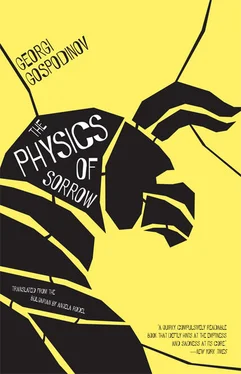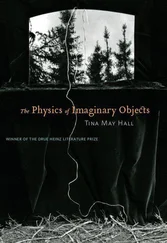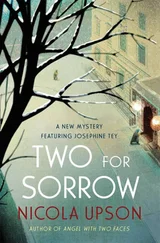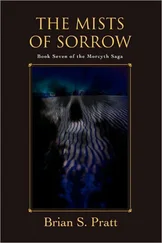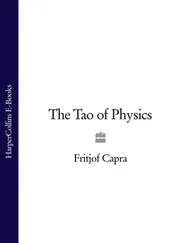The cuckolded husband is the one who had to make a decision. Matters (and the gun) are in his hands. It is up to him how everything will unfold, but he still doesn’t know what to do. He only knows that he needs to decide quickly, time is not on his side. The man has never before found himself in such a situation, he knows them only from movies and books. And none of that is helping him now. He pulls himself together. He points the gun at the man. That’s right, squirm, you dirty little rat. The rat has nestled into his very own bed. He has even left his watch on the nightstand. People kill someone just for setting foot onto private property, those kinds of signs are everywhere, so what should happen when someone enters into the holiest of holies, not just your home, but your bedroom, and not just into your bedroom, but into the woman you sleep with? On the other hand, what fault of it is his, he didn’t force his way in, someone let him in, what’s more, someone even called him over, gave him a sign. Isn’t that someone the guiltiest party in this situation? The guiltiest one — the woman. That is the radical decision, the adulteress must atone for her sin with death. Jesus, what melodramatic lines, is this Greek theater or a second-rate bourgeois play? To kill your wife over nothing, okay, well, it’s not anything, but she’s still your wife. And after he kills her, then what? Decision-making has never been his strong suit. Ever. If he has to pick out a pair of slippers from the store, his whole afternoon is shot. Black or brown? After he has mentally counted all his pants and divided them into two piles — those that go with brown and those that go with black — then he glances at the furniture in the room, because it would be good for the slippers to match it as well. After all of that, an hour has already gone by and he’s decided on the brown ones. But, horror of horrors, there are two types of brown slippers — with braid and without. On top of everything, there is darker and lighter braid. That’s how bad it is with slippers, but here we’re talking about murder and doling out justice. Who is guiltier in a case of fornication?
He lifts his gaze from them and sees, as if for the first time, their wedding photo above the bed. How could they do this right beneath it? It occurs to him that it would be very effective if he were to shoot their wedding picture, he imagines how the glass would shower down on their heads. What a metaphor. You, woman, have shot dead our married life itself, so our past gets a bullet to the head. Where should he aim, though — at himself or at her? We’re talking about the picture, but still. If he shoots at his own portrait that will be suicide of sorts.
The next moment, he turns and does the most unexpected thing before everyone’s astonished gazes — he pulls the trigger and shoots his friend. No external witness, no crime.
SCHEHERAZADE AND THE MINOTAUR
Usually stories are told by the one in the weaker position. This is clearest with Scheherazade. One doomed woman tells story after story to gain night after night. The thread of the story is the only thing leading her through the labyrinth of her doom. Inside the stories she tells, the most frequently tendered coins to buy someone’s life are again stories. It’s enough simply to recall the first — about the poor merchant who accidentally kills a genie’s son with an olive pit, and three passing sheikhs each buy a third of the merchant’s life from the fearsome father (here we really are talking about direct trade) by telling (selling) him stories. “ O Genie, thou Crown of the Kings of the Genies! Were I to tell thee the story of me and this gazelle and thou shouldst consider it wondrous wouldst thou give me a third part of this merchant’s blood? ”
If your stories are good and you really do impress me, replies the genie, then it’s a done deal. And it’s a done deal. The genie gives them the merchant’s blood, and Shahryar, who is listening to the story, gives one more night to the storyteller, Scheherazade. Blissful times. “By Allah, I will not slay her, until I shall have heard the rest of her tale.” But the story is endless. Just as the labyrinth is endless.
It’s obvious that that’s where Scheherazade got the idea from. You set off down the corridor of one story, which sends you off toward another, which leads you toward a third and so on. She has moved the labyrinth of stories into Shahryar’s bedroom. And — now here’s the secret — upon going inside, she has brought along her own executioner, she has sneaked him inside without him suspecting a thing. The two of them are there, but she holds the thread of the story, its thin opium leads Shahryar through the galleries and corridors. If the thread snaps, this mass murderer of women — because that’s what he is — will wake up, realize where he is, and all will be lost.
Where does the storyteller’s strength come from, even if it is the strength of the weaker one? Is it from his power over that which he tells? To hold in your hands, or rather, on the tip of your tongue, a world in which you can dole out death and put it off whenever you wish. A world that can be so real or so fabricated as to duplicate the real one, to become its double. If in one, death’s sword is hanging over you, you can escape down the redeeming corridors of the other.
Almost no one remembers or pays attention to how One Thousand and One Nights begins. In the exact same way as the myth of the Minotaur starts. With an infidelity. Pasiphaë, Minos’s wife, betrays him with a bull (Poseidon is peeking out from behind it). For their part, all the 1,001 stories begin thanks to the unfaithful wife of Shah Zaman, Shahryar’s younger brother, ruler of the Persian city of Samarkand. He sets out on a journey, realizes he has forgotten something, goes back and catches his wife embracing a slave. In one case, the lover is a bull, in the other a slave — always taboo bodies. For now, this infidelity costs only the couple involved their lives. Then the younger brother sets out to where he had been going — to visit his elder brother, Shahryar. There his brother’s wife’s infidelity is indeed on a mass scale, involving ten concubines and as many slaves. Shahryar decides to avenge his brother, himself, and the whole male world. Then the serial killing of women begins, along with the series of fairytales.
Night. Everything happens at night from here on out. In the eternal night of the Labyrinth, where the Minotaur lives, or in those thousand and one nights in Shahryar’s royal palace. Night is the time for stories. Day is another world, which has no inkling of night’s world. The two worlds should not be mixed.
A PLACE TO STOP
Some books need to be equipped with Ariadne’s thread. The corridors are constantly intertwining, crisscrossing one another. Sometimes I can see my grandfather going into the Esprit store on Friedrichstrasse with me, touching the cotton shirts distrustfully and muttering that he wouldn’t for the life of him buy anything that thin, which the wind could leapfrog through. Another time, when crossing the Doctor’s Garden with my daughter, a man wrapped up to his eyeballs in a scarf with his collar turned up high, nods at me as we pass. An episode I would have ignored if Aya hadn’t tugged at my sleeve and pointed out his strange two-horned shadow on the snow. The Minotaur had gone out for a walk in the labyrinth of the winter garden.
HOWL
Elenaa, Elenaaa, child of the wild desert, Amooour. A drunken song wafting through the night from the panel-block apartment building next door. We sang it as school kids at summer camps, but to this day I still don’t know which Elena and what desert it’s talking about. The obligatory kitsch that each and every one of us needed, some sort of romantic exoticism, an oasis amid the only possible desert here, in which the sand has been turned to concrete. The same song now, thirty years later, at three in the morning, drifting over with drunken longing from a group of friends celebrating nearby. This is the alternative Bulgarian song in the cosmos. Youth has passed away, socialism has passed away, yet the demons of erstwhile desires have remained, drowned in the alcohol of that which never happened. Those erstwhile school kids have grown old, they’ve gotten beer bellies, they’ve married themselves an Elena a piece, but something has gone wrong, something just isn’t what it should be. Meaninglessness has entered the uncertain Troy of the body via a wooden horse. That’s what all this howling in the night is about. I hate them and feel close to them in all their helpless sorrow and absurdity. Sometimes I feel like I want to add my howl to theirs. If I had a small, loyal pack of friends, I’d surely howl with them, happy and disconsolate amid the city’s eternal concrete fields. Amid its wild desert, Amooour. But I don’t have that pack. So I howl quietly, oh so quietly, and ostensibly with such subtle irony that I can barely hear myself.
Читать дальше
